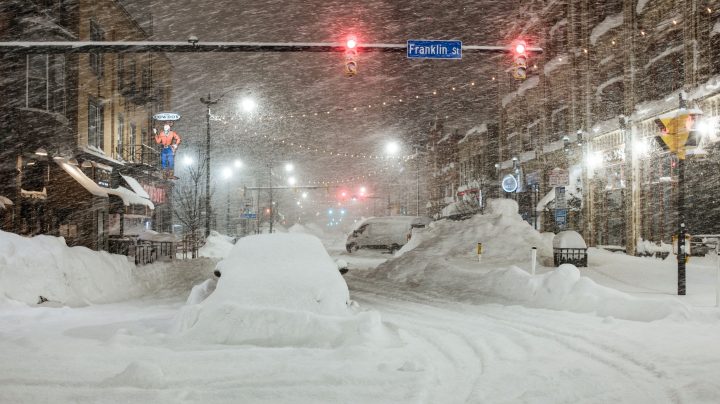
How a Buffalo business weathered a record-breaking storm

The National Oceanic and Atmospheric Administration released its annual billion-dollar disaster report last week. In all, there were 18 weather and climate disasters in the U.S. last year whose damages had price tags of more than $1 billion. That list includes hurricanes, tornadoes, wildfires and other natural disasters made harsher and more unpredictable by the climate crisis.
The deadly winter storm that hit parts of the Northeast just before Christmas was on that list. It dropped 100 inches of snow on Buffalo, New York, and claimed the lives of more than 40 people in the region.
For small businesses, the storm had financial consequences as well. In October, “Marketplace” host Kai Ryssdal spent time with several small-business owners in Buffalo — including Johanna Dominguez, who runs a plant shop on Elmwood Avenue called Put a Plant on It. He checked back in with her this week to see how she and her neighbors weathered the storm. The following is an edited transcript of their conversation.
Kai Ryssdal: How is business at Put a Plant on It? Let me ask that first.
Johanna Dominguez: Yeah, it’s been interesting. We had that record blizzard, which put a huge damper on business because that’s usually a really big week for us. But interestingly, from Jan. 1 to 16, sales have been up compared to last year, so that’s promising.
Ryssdal: It occurs to me that you have live things in that shop. And even though there is a blizzard of the century outside the door, somebody’s got to get in and tend to the plants, right?
Dominguez: Yeah. So usually I actually put on my snowshoes and I’ll snowshoe in. But this time, I actually couldn’t make it to the store for about three or four days.
Ryssdal: So what happened?
Dominguez: Thankfully, we didn’t lose power at the shop. I lost power for four days at home, but at the shop, we only lost power for about 2½ hours. The birds were fine, the plants were fine — we only lost a few. It could have been a lot worse, so we were very lucky.

Ryssdal: Yeah. Because I mean, you know, we put some pictures up when we came to town, but there are plants all over the place in that shop. There are birds. You had, like, a steam thing going. I mean, it’s amazing you only lost a couple.
Dominguez: Yeah, I’m not sure what percentage we lost, but it was very minor. I’m gonna guess probably about 5% of our inventory. But also we weren’t sure if we were able to make it back in the store because of course, they were predicting a monumental storm. But you know, they always predict a monumental storm, and so we didn’t think it’d be that bad. But before we left that day, I talked to my employees and I said, “Let’s make sure in case we can’t make it in. Let’s water everything that we think will need water in the next two or three days.” So that definitely helped us.

Ryssdal: What do you hear from your peer small businesses up and down Elmwood? How did they survive?
Dominguez: I definitely have heard from other business owners that it was a tough holiday season, especially that week between Christmas and New Year’s, because [usually] everyone’s here spending time with family and they want to come back and visit the stores, and we didn’t have that this year. So I’m in a group chat with a bunch of the other business owners, and the other stores on the strip are definitely feeling the fact that we did not have a holiday season.
Ryssdal: So, the first couple of weeks of January was good for you coming out of the storm. What are you seeing as you try to plan your 2023?
Dominguez: We’re, again, focusing a lot on our services. We’re focusing on partnering with other businesses that have a larger space and doing off-site classes. Those are starting to get really popular, so we partnered up with a local brewery that’s in a different area. Pop-ups — you never know if they’re going to be successful or not. But with a class, there’s always a solid attendance fee, so then that’s more of a guaranteed income. So I’m trying to push those a little bit more, as opposed to a pop-up or something like that, because then I’ll know I’ll have, like, 20 participants who are paying $40 to $55 in order to take this class.

Ryssdal: Right. Is that a cat, by the way, in the background?
Dominguez: Yes. That’s my cat.
Ryssdal: OK, just checking. What about pricing power and plant prices? They’re down, right?
Dominguez: Yeah. So I actually looked through my numbers really quick. We’ve only been open for three years, and so in the month of December 2020, we did $65,869. In [December] 2021, made less because [plant] prices have gone down. And with 2022 — Dec. 23, which was when the blizzard hit, through Dec. 31, it was a huge slump, which was kind of terrible to see. We just did $5,000 [in sales] because we lost that week.
Ryssdal: Yeah, but that’s the name of the game in small business, right? You just gotta keep going.
Dominguez: Totally.
There’s a lot happening in the world. Through it all, Marketplace is here for you.
You rely on Marketplace to break down the world’s events and tell you how it affects you in a fact-based, approachable way. We rely on your financial support to keep making that possible.
Your donation today powers the independent journalism that you rely on. For just $5/month, you can help sustain Marketplace so we can keep reporting on the things that matter to you.











